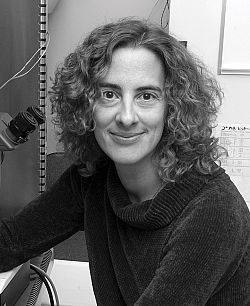Local Catholic appointed to Pontifical Academy for Life
Friday, Jan. 23, 2015
By Marie Mischel
Intermountain Catholic
SALT LAKE CITY — Dr. Maureen Condic, an associate professor of neurobiology and anatomy at the University of Utah School of Medicine, has received a five-year appointment as a corresponding member for the Pontifical Academy for Life.
The academy has 138 members, all experts in biomedical science or related disciplines. They are drawn from throughout the world; only 12 are from the United States.
Condic’s appointment is a prestigious honor, said the Most Rev. John C. Wester, Bishop of Salt Lake City.
“As a diocese, we’re very proud of her, of the work she has done as a Catholic, as a committed woman and as a scientist toward the promotion of respect for all life, from conception to natural death,” the bishop added. “She’s really been an advocate for a pro-life message and she has done this at great personal sacrifice. It has not always been easy for her; she has suffered in her profession because of the very strong stance she has taken in defending life, and yet she has not wavered. She has been very consistent in promoting the sanctity of human life as a gift of God.”
Condic was nominated by an existing member of the Academy for Life, “and then the appointment was confirmed by someone of authority in the local arena as well as the consideration by our Directive Council,” said Father Scott Borgman, JCL, coordinating secretary for the academy, in an email interview.
A nomination by a current academy member is one primary criterion for acceptance of a corresponding member; the other is the nominee’s scientific background, “usually determined by the extensive publications in scientific journals,” Fr. Borgman said. “Of course the person must be recognized as an expert in his/her area regarding the protection and defense of life.”
The Pontifical Academy for Life, which was founded in 1994 by Pope John Paul II, is dedicated to “study, information and formation on the principal problems of biomedicine and of law, relative to the promotion and defense of life, above all in the direct relation that they have with Christian morality and the directives of the Church’s Magisterium,” according to the website http://www.academiavita.org.
Condic, who holds a doctoral degree from the University of California, Berkeley, runs a research laboratory at the U of U and teaches medical students; she also serves as the ombudsman.
In addition, “For the last 10 or 15 years I’ve also been pretty heavily involved in bioethics issues focused on life-related issues” such as when life begins, what constitutes brain death, and stem-cell research, she said.
“I consider myself primarily and fundamentally and in my most basic definition a scientist,” Condic said.
Nevertheless, she sees no conflict between religion and science. For example, “There is simply no doubt scientifically that we know exactly when life begins, and it’s a very well defined scientific moment taking about 250 milliseconds or a quarter of a second to complete,” she said.
Controversy arises when the issue changes from a scientific viewpoint to a moral question, she said.
For her, “The real question is ‘When do we as a society and as individuals choose to value that human life?’ … I think there are lots of possible answers to this question, which is why people will fall back on ‘nobody knows’” as the answer to when life begins, because this answer avoids controversy, she said.
The appointment to the Pontifical Academy for Life “will give me a tremendous opportunity to make a very real contribution to extremely important issues that touch on all of our lives, on things that are very intimate to all of us,” Condic said. “Life issues are really central to how we see ourselves, to our children, to ourselves as we face death, to medicine – people who are suffering – and I think it’s important to have a scientific voice informing and contributing to these kinds of discussions. I’m very grateful to be there and I look forward to making those contributions.”
Condic will attend her first meeting of the Pontifical Academy for Life in March; their topic will be “Assisting the Elderly and Palliative Care.”
For questions, comments or to report inaccuracies on the website, please CLICK HERE.
© Copyright 2024 The Diocese of Salt Lake City. All rights reserved.
© Copyright 2024 The Diocese of Salt Lake City. All rights reserved.


Stay Connected With Us